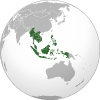Myanmar Air Force
| Myanmar Air Force | |
|---|---|
| တပ်မတော် (လေ) (Burmese) | |
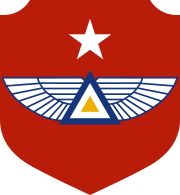 Emblem of the Myanmar Air Force | |
| Founded | 15 January 1947 |
| Country | |
| Type | Air force |
| Role | Aerial warfare |
| Size | |
| Part of | |
| Nickname(s) | Tatmadaw (Lay) |
| Anniversaries | 15 December 1947 |
| Engagements | |
| Commanders | |
| Commander-in-Chief of Myanmar Armed Forces | |
| Minister of Defence | |
| Commander-in-Chief of the Air Force | |
| Insignia | |
| Roundel |  |
| Fin flash |  |
| Ensign |  |
| Aircraft flown | |
| Attack | Nanchang Q-5 |
| Fighter | Sukhoi Su-30, Mikoyan MiG-29, JF-17 Thunder |
| Helicopter | Mil Mi-2, Mil Mi-17, Bell UH-1 Iroquois, Aérospatiale Alouette III, PZL W-3 Sokół |
| Attack helicopter | Mil Mi-35P |
| Interceptor | F-7llK |
| Patrol | Britten-Norman BN-2 Islander |
| Trainer | Yak-130, FTC 2000G, K-8W, Grob G 120TP, HAL HJT-16 Kiran, K-8 Karakorum |
| Transport | Shaanxi Y-8, Harbin Y-12, Beechcraft 1900, ATR 42, ATR 72, Fokker 70 |
The Myanmar Air Force (Burmese: တပ်မတော် (လေ), romanized: Tatmadaw (Lay), lit. 'Armed Forces (Air Force)', pronounced [taʔmədɔ̀ (le)]) is the aerial branch of the Tatmadaw, the armed forces of Myanmar. The primary mission of the Myanmar Air Force (MAF) since its inception has been to provide transport, logistical, and close air support to the Myanmar Army in counter-insurgency operations.[2] It is mainly used in internal conflicts in Myanmar, and, on a smaller scale, in relief missions,[3] especially after the deadly Cyclone Nargis of May 2008.
History
[edit]Post-independence era (1948–1990)
[edit]The Myanmar Air Force (MAF) was formed as the Burmese Air Force on 16 January 1947, while Burma (as Myanmar was known until 1989) was still under British rule. By 1948, the fleet of the new air force included 40 Airspeed Oxfords, 16 de Havilland Tiger Moths, four Austers, and three Supermarine Spitfires transferred from the Royal Air Force, and had a few hundred personnel.[2]
The Mingaladon Air Base HQ, the main air base in the country, was formed on 16 June 1950. No.1 Squadron, Equipment Holding Unit and Air High Command - Burma Air Force, and the Flying Training School, were placed under the jurisdiction of the base. A few months later, on 18 December 1950, No. 2 Squadron was formed with nine Douglas Dakotas as a transport squadron. In 1953, the Advanced Flying Unit was formed under the Mingaladon Air Base with de Havilland Vampire T55s, and by the end of 1953 the Burmese Air Force had three main airbases, at Mingaladon, Hmawbi, and Meiktila, in central Burma.[2]
In 1953, the Burmese Air Force bought 30 Supermarine Spitfires from Israel and 20 Supermarine Seafires from the United Kingdom, and in 1954 it bought 40 Percival Provost T-53s and 8 de Havilland Vampire Mark T55s from the United Kingdom. In late 1955, the Burmese Air Force formed a Maintenance Air Base in Mingaladon, No. 501 Squadron Group (Hmawbi Airbase) and No. 502 Squadron Group (Mingaladon Air Base). In 1956, the Burmese Air Force bought 10 Cessna 180 aircraft from the United States. The same year, 6 Kawasaki Bell 47Gs formed its first helicopter unit. The following year, the Burmese Air Force procured 21 Hawker Sea Fury aircraft from the United Kingdom and 9 de Havilland Canada DHC-3 Otters from Canada. In 1958, it procured 7 additional Kawasaki Bell 47Gs and 12 Vertol H-21 Shawnees from the United States.[2] Five years later, No. 503 Squadron Group was formed with No. 51 Squadron (de Havilland Canada DHC-3 Otters and Cessna 180s) and No. 53 Squadron (Bell 47Gs, Kaman HH-43 Huskies, and Aérospatiale Alouettes) in Meiktila.[2]
On 15 February 1961, an unmarked Republic of China Air Force Consolidated PB4Y Privateer came into Burmese air space carrying supplies for Chinese Kuomintang forces fighting in northern Burma, and was intercepted by three Hawker Sea Fury fighters of the Burmese Air Force. The intruding bomber and one Burmese fighter crashed in Thailand during the incident.[4] On 17 February, a team from Burmese 9th Front Brigade left for the crash site. A 12.7mm bullet was fired into the fuselage of UB-466, hitting pilot officer Peter as well,[clarification needed] breaking five of his ribs. Peter was recorded in the history of Burmese Air Force as an airman who gave his life for the country and the people.[5] In 1962, a new radar station in Mingaladon and a mobile radar station in Lwemwe (near Tachileik) were put into operation. By December 1964, the Burmese Air Force had 323 officers and 5,677 other ranks and it acquired Lockheed T-33 Shooting Star jet trainers and a new radar station, which could operate within a 120-mile (193-km) radius, was opened in Namsang. In 1966, the radar arm of the air force underwent a complete overhaul and upgrade, with new radar stations being operated. The Namsang Radar station was upgraded to cover about a 200-mile (322-km) radius and renamed No.71 Squadron. In the same year, the Burmese Air Force formed the No. 1 Airborne Battalion with 26 officers and 750 other ranks.[citation needed]
On 1 January 1967, the Burmese Air Force reorganized its command structure. No. 501 Squadron Group in Hmawbi became No. 501 Air Base HQ; No. 502 Squadron Group in Mingalardon became No. 502 Air Base HQ; and No. 503 Squadron Group in Meiktila became No. 503 Air Base HQ in Meiktila. It also maintained airfield detachments in Lashio and Kengtung to cope with the insurgency of Communist Party of Burma in the northeast border region of the country.[2]
In 1975, the Burmese Air Force took delivery of 18 Bell 205A and seven Bell 206B helicopters from the United States under the International Narcotic Control Program (INCP). In March 1975, it bought 20 SIAI-Marchetti SF.260 trainers from Italy.[2]
Between 1976 and 1987, the Burmese Air Force bought seven Pilatus PC-6 Turbo porter STOL aircraft; and 16 Pilatus PC-7 and 10 Pilatus PC-9 turboprop trainers from Switzerland. These aircraft were deployed in Lashio for close air support in counter-insurgency operations.[2]
In 1989, the Burmese Air Force was renamed the Myanmar Air Force in accordance with the country changing its name from Burma to Myanmar.
Modernisation programme (1990–present)
[edit]In the early 1990s, the Burmese Air Force upgraded its facilities and introduced two new air base headquarters and existing air base headquarters were renamed. It also significantly upgraded its radar and electronic warfare facilities. The Burmese Air Force bought more than 100 aircraft from the People's Republic of China, which included F7 IIK interceptors, FT-7 trainers, A-5C ground attack aircraft, FT-6M trainers, K-8 trainers and Y-8 transport aircraft.
By 2000, the Myanmar Air Force had received 62 F7 IIK interceptors from China.[2] Assistance from Israel was sought to refurbish and upgrade all operational F-7s and FT-7s: these were to get the Elta EL/M-2032 air-to-air radar,[6][unreliable source?] Rafael Python Mk. III and even Litening laser-designator pods. The same equipment was then installed on the two-seater FT-7 fighter trainers as well. In a related deal, Israel transferred at least one consignment of laser-guided bombs, but no deliveries of any other weapons are known.[citation needed] Since the Elbit contract was won in 1997, the air force had acquired at least one more squadron of F-7 and FT-7 aircraft from China, but these were not upgraded.
Between 1992 and 2000, the Myanmar Air Force took delivery of 36 A-5C ground attack aircraft. In addition, the Myanmar Air Force also bought 20 Soko G-4 Super Galeb armed jet trainers from Yugoslavia in 1991, but only approximately 6 aircraft were delivered due to the breakup of Yugoslavia.
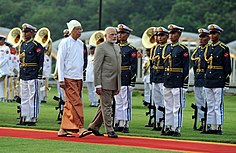
The Myanmar Air Force procured a range of helicopters from Russia and Poland between 1991 and 1997; it bought 20 PZL-Swidnik Mil Mi-2 and 13 PZL W-3 Sokol helicopters from Poland and 13 Mil Mi-17 from Russia. These helicopters were put into counter-insurgency operations against ethnic rebels in the Irrawaddy River delta. Four Mil Mi-2, four PZL W-3 Sokol, and two Bell 205 helicopters were grouped as an air detachment stationed in Bogalay for "Operation Monediang" in October 1991. During this operation, Mil Mi-2 helicopters were fitted with a wide range of weapons to provide ground attack and air cover for heliborne air assault operations. Four Mi-2s of the air detachment made a total of 80 sorties over 17 targets with nearly 82 flying hours. Four PZL W-3 Sokol helicopters, unarmed and used for troop transport carrying 20 airborne commandos, each flew 443 missions with 197 flying hours. Bell 205 helicopters carried out search and rescue, and they flew 263 missions with over 114 flying hours.[2]
In 2001, the Myanmar Air Force bought 12 MiG-29 fighter aircraft (10 MiG-29Bs and two MiG-29UB two seats trainers)[2] from Belarus. This was followed by an additional order of 20 MiG-29 (10 MiG-29B, 6 MiG-29SE and 4 MiG-29UB) as part of a $570 million defence package in December 2009. 10 MiG-29B were upgraded to SM (mod) standard in 2017.[7] The air force also ordered 10 Mil Mi-35 gunship helicopters as part of a $71 million defence package signed in December 2009.[8]
Despite these modernisation measures, the capability of the Myanmar Air Force remained questionable, due to its absence during the Battle of Border Post 9631 with Thailand and the rescue missions related to Cyclone Nargis in May 2008.[citation needed]
A contract had been signed in December 2015 with Pakistan for the purchase of JF-17 Thunder multirole fighter, which was jointly developed by Chengdu Aircraft Industry Group and Pakistan Aeronautical Complex, to Myanmar Air Force. However, in March 2018 it was reported that the deal for the purchase of JF-17 Thunder has been suspended by Pakistan.[9] However, four JF-17 Block-IIs were seen at Air Force Day celebrated in December 2018. Under a bilateral contract, the MAF ordered six Su-30SM fighters from Russia in 2018.[10]
Since the military coup in February 2021, Myanmar Air Force aircraft have been used in airstrikes on villages,[11][unreliable source?] killing noncombatant civilians including elders, humanitarian workers and children while forcing thousands of others to flee their homes.[citation needed]
Commanders in Chief and Chiefs of Air Staff since 1948
[edit]Commander-in-Chief and Chief of Air Staff in chronological order:
| ID | Rank | Name | Serial |
|---|---|---|---|
| 1 | Wing Commander | Saw Shi Sho | BAF1020 |
| 2 | Major | Tommy Clift (T. Clift) | BAF1005 |
| 3 | Lieutenant Colonel | Thura Selwyn James Khin | BAF1009 |
| 4 | Brigadier General | Thura Tommy Clift | BAF1005 |
| 5 | Brigadier General | Thaung Dan | BAF1042 |
| 6 | Major General | Thura Saw Phyu | BAF1047 |
| 7 | Major General | Ko Gyi | BAF1059 |
| 8 | Lieutenant General | Tin Tun | BAF1127 |
| 9 | Lieutenant General | Thein Win | BAF1193 |
| 10 | Lieutenant General | Tin Ngwe | BAF1312 |
| 11 | Lieutenant General | Kyaw Than | BAF1334 |
| 12 | Major General | Myint Swe | BAF1587 |
| 13 | General | Myat Hein | BAF1682 |
| 14 | General | Khin Aung Myint | BAF1754 |
| 15 | General | Maung Maung Kyaw | BAF1925 |
| 16 | General | Htun Aung | BAF1982 |
Rank structure
[edit]Commissioned officer ranks
[edit]The rank insignia of commissioned officers.
| Rank group | General / flag officers | Senior officers | Junior officers | |||||||||||||||||||||
|---|---|---|---|---|---|---|---|---|---|---|---|---|---|---|---|---|---|---|---|---|---|---|---|---|

|

|

|

|

|

|

|

|

|

|

|

| |||||||||||||
| ဗိုလ်ချုပ်မှူးကြီး bauilaʻ khayupaʻ mahūʺkarīʺ |
ဒုတိယ ဗိုလ်ချုပ်မှူးကြီး dautaiya bauilaʻ khayupaʻ mahūʺkarīʺ |
ဗိုလ်ချုပ်ကြီး bauilaʻ khayupaʻ karīʺ |
ဒုတိယ ဗိုလ်ချုပ်ကြီး dautaiya bauilaʻ khayupaʻ karīʺ |
ဗိုလ်ချုပ် bauilaʻ khayupaʻ |
ဗိုလ်မှူးချုပ် bauilaʻ mahūʺkhayupaʻ |
ဗိုလ်မှူးကြီး bauilaʻ mahūʺkrīʺ |
ဒုတိယ ဗိုလ်မှူးကြီး dautaiya bauilaʻ mahūʺ krīʺ |
ဗိုလ်မှူး bauilaʻ mahūʺ |
ဗိုလ်ကြီး bauilaʻ krīʺ |
ဗိုလ် bauilaʻ |
ဒုတိယ ဗိုလ် dautaiya bauilaʻ | |||||||||||||
Other ranks
[edit]The rank insignia of non-commissioned officers and enlisted personnel.
| Rank group | Senior NCOs | Junior NCOs | Enlisted | |||||||||||||||||||||||||||||||||
|---|---|---|---|---|---|---|---|---|---|---|---|---|---|---|---|---|---|---|---|---|---|---|---|---|---|---|---|---|---|---|---|---|---|---|---|---|

|

|
No insignia | No insignia | |||||||||||||||||||||||||||||||||
| အရာခံဗိုလ် ’araākhaṃ bauilaʻ |
ဒုတိယအရာခံဗိုလ် dautaiya ’araākhaṃ bauilaʻ |
အုပ်ခွဲတပ်ကြပ်ကြီး aupaʻ khavai tapaʻ karpaʻ karīʺ |
တပ်ကြပ်ကြီး tapaʻ karpaʻ karīʺ |
တပ်ကြပ် tapaʻ karpaʻ |
ဒုတိယတပ်ကြပ် dautaiya tapaʻ karpaʻ |
တပ်သား tapaʻ saāʺ |
တပ်သားသစ် tapaʻ saāʺ sacaʻ | |||||||||||||||||||||||||||||
Organisations
[edit]- Air Force headquarters, Ministry of Defence (Naypyitaw)[2]
- Aircraft Production and Repair Base Headquarters (Hmawbi)
- Air Force - Ground Training Base (Meiktila)
- Air Force - Fly Training Base (Shante)
Air bases
[edit]- Pathein Air Base HQ
- Hmawbi Air Base HQ (former 501 Air Base)
- Mingaladon Air Base HQ (former 502 Air Base)
- Magway Air Base HQ
- Myitkyina Air Base HQ (former 503 Air Base)
- Myeik Air Base HQ
- Namsang Air Base HQ
- Taungoo Air Base HQ
- Shante Air Base HQ is close to Meikhtila in neighboring Pyitharyar
- Meiktila Air Base - helicopter training and operations base
- Homemalin Air Base HQ

Myanmar Air Force also utilised civilian airfields as front-line air fields in case of foreign invasion.
Air defence
[edit]The Office of the chief of Air Defence is one of the major branches of the Tatmadaw. It was established as the Air Defence Command in 1997 but was not fully operational until late 1999. It was renamed the Bureau of Air Defence in the early 2000s.In early 2000s, the Tatmadaw established the Myanmar Integrated Air Defence System (MIADS) with help from Russia, Ukraine and China. It is a tri-service bureau with units from all three branches of Myanmar Armed Forces. All Air Defence assets except Anti-Aircraft Artillery are integrated into MIADS.[12]
Equipment
[edit]Aircraft
[edit]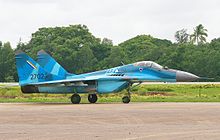
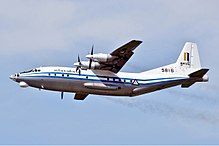


Armament
[edit]| Name | Origin | Type | Notes | |||
|---|---|---|---|---|---|---|
| Air-to-air missile | ||||||
| PL-2 | China | Air to air missile | 340 missiles obtained[23] | |||
| PL-5 | China | Air to air missile | 200 missiles obtained[24] | |||
| PL-12 | China | Air to air BVR missile | 60 missiles obtained[24] | |||
| R-27 | Russia | Air to air BVR missile | 100 missiles obtained[24] | |||
| R-73 | Russia | Air to air Short range IR Missile | 285 missiles obtained[24] | |||
| Anti-ship missile | ||||||
| YJ-83 | China | 30 missiles obtained[23] | ||||
| Aerial bomb | ||||||
| LY-502 | China | unknown[25] | ||||
Radars
[edit]The Air Force has several radar installations including the three-dimensional surveillance YLC-2 Radar, the P-37 Early-warning radar system, the JLP-40 defensive radar, and the Galaxy EWR system, which is linked with Integrated Air Defence office.[12][26][27][28][29][23]
Markings
[edit]Myanmar national insignia (white triangle with yellow field in the centre and borders in blue) is usually applied on six positions. The serialling system of Myanmar Air Force aircraft is suggested to serve as both – unit and individual aircraft identity, this could not be confirmed so far, however. Most of the older aeroplanes carried the serials with the prefix "UB" and the numbers in Burmese. Sometimes the serials were outlined in white. Combat aircraft generally carry serials in black.
Accidents and incidents
[edit]On 24 January 1980, a Burma Air Force FH-227 crashed when an engine failed shortly after take-off, killing all but one of the 44 people on board. One person on the ground was injured.[30]
On 11 June 2014, a Mig-29UB caught fire and crashed on to farmland near Myothit township of Magway at 8:30 a.m. (local time). Two pilots safely ejected.[31][32][33]
On 10 February 2016, a Beech 1900 aircraft crashed after taking off from Naypidaw Airport, killing 5 military personnels.[34]
On 14 June 2016, a Mi-2 helicopter crashed near the Yangon–Mandalay Expressway at being refueled at the Taungngu airbase, killing three military servicemen on board.[35]
2017 Myanmar Air Force Shaanxi Y-8 crash: On 7 June 2017, a Shaanxi Y-8 was reported missing 30 nautical miles (56 km) west to Dawei. The aircraft was carrying 122 people. There were no survivors.
On 3 April 2018, An F-7 fighter aircraft of Taungoo Air Base crashed into a farm near KyunKone Village in Taungoo. The aircraft was on a training route during the crash while trying to land the ground at around 11:30 am, killing its pilot.[36]
On 16 October 2018, two F-7Ms crashed near Magway, Myanmar, killing both pilots and a civilian on the ground. Both aircraft struck a broadcast tower. One plummeted into a rice paddy, while the other nose-dived near a Buddhist pagoda in the Magway region of central Myanmar.[37]
On 3 May 2021, one Mi-35 helicopter was shot down near the town of Moemauk in Kachin province by the Kachin Independence Army in response to the MAF's air raid. There was no confirmation from the MAF nor the KIA on which AA system was used by the KIA in the incident.[38][39]
On 11 June 2021, a Beechcraft 1900 crashed on its landing approach to Pyin Oo Lwin's airport, killing 12 people including a senior Buddhist monk, the abbot of Zay Kone Monastery in Pyinmana.[40]
On 16 February 2022, an A-5 fighter jet crashed near Ohn Taw village in Sagaing Region.[41]
On 29 March 2022, a Mi-17 helicopter crashed and injured five people on board near Hakha, Chin State.[42]
On 11 November 2023, a K-8W trainer aircraft of the Myanmar Air Force crashed in Hpruso Township, Karenni State. Local rebels claimed to have shot it down, while the Myanmar Air Force claimed that it was a mechanical failure, and the pilot was later captured.[43]
On 3 January 2024, a Mi-17 was shot down by the Kachin Independence Army using FN-6 MANPAD in Waimaw Township, Kachin State, killing all seven people on board.[44]
On 16 January 2024, the Kachin Independence Army successfully shot down an FTC-2000G trainer/fighter of the Myanmar Air Force in the Namhpatkar area of northern Shan State.[45]
In January 2024, a Myanmar Air Force Y-8 on a mission to evacuate troops who had sought refuge in Mizoram, India, overshot its landing in Lengpui Airport. There were no deaths but the plane was badly damaged.[46]
On 29 January 2024, the Karen National Liberation Army shot down a Junta helicopter above Myawaddy Township near the Thai border. During the incident Brigadier General Aye Min Naung, the 44th LI Division commander, Colonel Soe Tun Lwin, LI Battalion 9's acting commander, pilot Colonel Toe Oo and two army captains were supposedly killed according to military sources.[47]
On 29 February 2024, one MiG-29SMT fighter of Myanmar Air Force crashed in southwest of Salin District, Magway Region. This aircraft crashed when it was on its way to combat mission, Myanmar military blamed the crash on a technical failure. One pilot ejected successfully and escaped the crash.[48][49]
On 2 August 2024, a Myanmar Air Force Eurocopter AS365 Dauphin crashed after take off near Hmawbi Airport, Yangon. The aircraft was on a training flight and the cause of the crash was blamed on an engine failure. 2 were injured and 2 was killed. The deceased was identified as Maj-Gen Soe Thin Latt and Copilot Col Myo Thaung.[50]
See also
[edit]References
[edit]- ^ a b International Institute for Strategic Studies (13 February 2024). The Military Balance 2024 (1st ed.). London: Routledge. pp. 297–298. ISBN 978-1032780047.
- ^ a b c d e f g h i j k l Aung Myoe, Maung (22 January 2009). Building the Tatmadaw: Myanmar Armed Forces Since 1948. ISEAS Publishing. doi:10.1355/9789812308498. ISBN 978-981-230-849-8.
- ^ "Humanitarian Civil-Military Coordination in Emergencies: Towards a Predictable Model" (PDF). Regional Consultative Group on Humanitarian Civil-Military Coordination for Asia and the Pacific. 2017. pp. 79–82. Archived from the original (PDF) on 6 October 2022. Retrieved 6 June 2019.
- ^ "Intrusions, Overflights, Shootdowns and Defections During the Cold War and Thereafter." Archived 14 May 2013 at the Wayback Machine myplace.frontier.com. Retrieved: 28 May 2013.
- ^ [in Myanmar]"Three Burmese airmen fight in the first air battle in Southeast Asia". 19 October 2017.
- ^ "MiG-21 2000 Fighter Ground Attack, Russia." Airforce-Technology.com. Retrieved: 1 December 2010.
- ^ "Myanmar MiG-29 Upgrade Revealed". ainonline.com. Retrieved 3 April 2019.
- ^ "Russia, Burma sign arms deal". 23 December 2009. Archived from the original on 9 April 2018. Retrieved 9 April 2018.
- ^ "Pakistan suspends JF- 17 deal with Myanmar - the Morning Mail". Archived from the original on 26 August 2018. Retrieved 26 August 2018.
- ^ "Russia Begins Assembly Of Su-30SMs Meant For Myanmar". www.defenseworld.net. Retrieved 4 October 2019.
- ^ "Over 70 Civilians Trapped by Myanmar Junta Airstrikes on Sagaing Village". The Irrawaddy. 12 August 2022.
- ^ a b IndraStra Global Editorial Team (30 October 2020). "Myanmar Integrated Air Defense System". Archived from the original on 31 October 2020. Retrieved 7 December 2015.
- ^ "Россия завершила поставку ВВС Мьянмы шести истребителей Су-30СМЭ". ЦАМТО / Центр анализа мировой торговли оружием (in Russian). 28 December 2024. Retrieved 31 December 2024.
- ^ a b c d e f g h i j k l m n o p q r s t u v w x y Hoyle, Craig (2023). "World Air Forces 2024". FlightGlobal. Retrieved 15 March 2024.
- ^ "Россия поставила ВВС Мьянмы три вертолета Ми-17". ЦАМТО / Центр анализа мировой торговли оружием (in Russian). 9 January 2025. Retrieved 14 January 2025.
- ^ "Myanmar Air Force inducts new aircraft". Janes.com. 17 December 2021. Retrieved 20 December 2021.
- ^ Beech, Hannah (24 December 2021). "Worldly, Charming, and Quietly Equipping a Brutal Military". The New York Times – via NYTimes.com.
- ^ "Myanmar Air Force bolsters fleet with the commission of new aircraft". shephardmedia.com. Retrieved 10 January 2023.
- ^ The Military Balance 2024, p.298
- ^ a b c "Is Myanmar Using Armed Chinese Drones For Counterinsurgency?". thediplomat.com. 2016. Retrieved 10 July 2020.
- ^ Weinberger (Foreign Policy), Sharon (10 May 2018). "China Has Already Won the Drone Wars". Archived from the original on 23 October 2020.
{{cite web}}:|last=has generic name (help) - ^ United Nations Human Right Office of the High Commissioner, OHCHR (August 2019). "Arms and Military Equipment Suppliers to the Tatmadaw" (PDF). United Nations. Archived (PDF) from the original on 23 October 2020.
- ^ a b c "SIPRI Trade Register". Stockholm International Peace Research Institute. Archived from the original on 13 May 2011. Retrieved 17 August 2020.
- ^ a b c d "Arms Transfers Database". Stockholm International Peace Research Institute. Archived from the original on 13 May 2011. Retrieved 7 October 2021.
- ^ "How China, Russia Keep Myanmar Junta's Deadly Aerial Campaign Aloft". 12 June 2023.
- ^ Maung, Aung Myoe (2009). Building the Tatmadaw: Myanmar Armed Forces Since 1948. Institute of Southeast Asian Studies. p. 107. ISBN 978-981-230-848-1.
- ^ Gander, Terry J. (22 November 2000). "National inventories, Myanmar (Burma)". Jane's Infantry Weapons 2001-2002. p. 3112.
- ^ China's People, Military (4 September 2014). "外媒:中国售缅甸机动雷达 巴基斯坦评价不错". Archived from the original on 25 December 2020. Retrieved 25 December 2020.
- ^ THE IRRAWADDY. "Junta Stations New Missile Battalion on Border". Archived from the original on 15 October 2020.
- ^ "Burma jet crash kills 43", Daily News (New York), 26 January 1980, p. C9.
- ^ "မကွေးလေတပ်စခန်းက MIG 29 တိုက်လေယာဉ်ပျက်ကျ". Radio Free Asia (in Burmese). Retrieved 7 October 2020.
- ^ "ေလ့က်င့္ေရးတုိက္ေလယာဥ္ပ်က္က်". VOA News (in Burmese). 11 June 2014. Retrieved 7 October 2020.
- ^ "ASN Wikibase Occurrence # 166859". Aviation Safety Network. Retrieved 6 October 2020.
- ^ "Myanmar military plane crash kills 4". The Jakarta Post. 10 February 2016. Retrieved 18 February 2022.
- ^ "Military helicopter crash kills 3 in Myanmar". 14 June 2016. Retrieved 18 February 2022.
- ^ "Myanmar military training jet crashes, pilot killed". thestatesman. 3 April 2018. Retrieved 7 October 2020.
- ^ Beech, Hannah; Nang, Saw (16 October 2018). "2 Myanmar Fighter Jets Crash, Killing Pilots and an 11-Year-Old". The New York Times. Archived from the original on 17 October 2018. Retrieved 18 October 2018.
- ^ "Kachin rebels shoot down military helicopter as parcel bomb kills 5 in central Myanmar". CNN. Reuters. 4 May 2021. Retrieved 18 February 2022.
- ^ "Operation 1027 Delivered Three Months of Humiliation to Myanmar's Junta". The Irrawaddy. 26 January 2024. Retrieved 5 March 2024.
- ^ "Myanmar military plane crash kills 12, including senior monk". CNA. 11 June 2021.
- ^ Venckunas, Valius (17 February 2022). "Fighter jet crashes in Myanmar, killing pilot". Aerotime Hub. Retrieved 17 February 2022.
- ^ "Myanmar Junta Helicopter Crashes in Chin State". The Irrawaddy. 29 March 2022. Retrieved 30 March 2022.
- ^ "Incident Hongdu K-8W Karakorum 3942". aviation-safety.net. Retrieved 20 January 2024.
- ^ "Accident Mil Mi-17". aviation-safety.net. Retrieved 20 January 2024.
- ^ "Junta Fighter Jet Shot Down By KIA in Northern Shan State". Burma News International. Retrieved 20 January 2024.
- ^ Dangwal, Ashish (23 January 2024). "Made In China Shaanxi Y-8 Aircraft Crashes In India; Was Operated By Myanmar To Ferry Its Soldiers". The EurAsian Times. Retrieved 27 January 2024.
- ^ "MFive Myanmar Junta Officers Killed in Helicopter Crash". Irrawady. 29 January 2024. Retrieved 30 January 2024.
- ^ "Incident MiG-29SMT 2721". aviation-safety.net. Retrieved 5 March 2024.
- ^ "Myanmar's military blames technical fault for crash of fighter jet on training flight". AP News. 29 February 2024. Retrieved 5 March 2024.
- ^ "Incident AS365 Hmawbi". Myanmar Now. Retrieved 2 July 2024.
Bibliography
[edit]- Aloni, Shlomo & Arnold, Peter R. (January–February 1999). "From Israel to Burma: Operation Orez, Supplying and Ferrying Spitfires, Part Two". Air Enthusiast (79): 2–11. ISSN 0143-5450.
- Gurdon, Philip (March–April 1999). "A Sudden & Dusty Arrival: Belly-landing a Spitfire During a Ferry Flight". Air Enthusiast (80): 60. ISSN 0143-5450.
- Hoyle, Craig. "World Air Forces Directory". Flight International, Vol. 182, No. 5370, 11–17 December 2012. pp. 40–64. ISSN 0015-3710.
- Hoyle, Craig (25 November 2022). "2023 World Air Forces". FlightGlobal. Retrieved 3 January 2023.
- World Aircraft Information Files. Brightstar Publishing, London. File 333 Sheet 05

